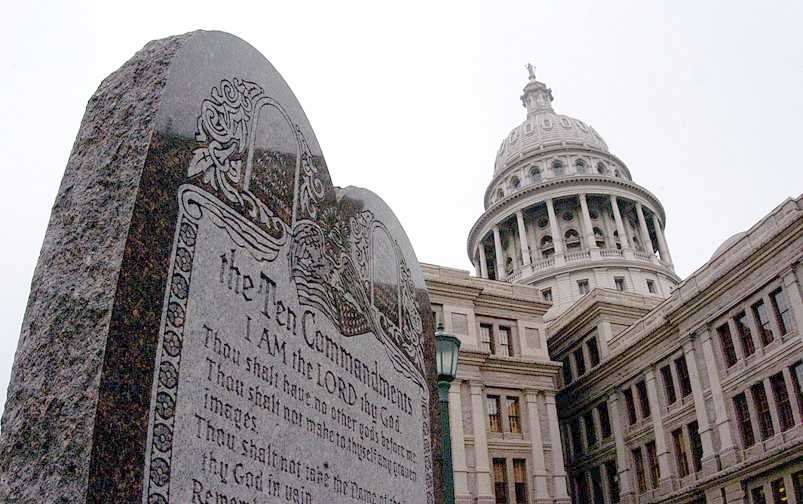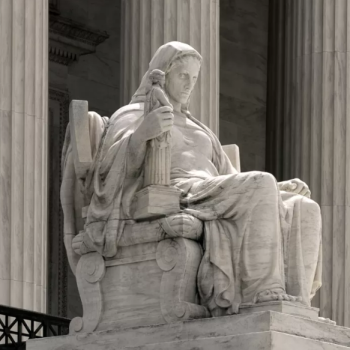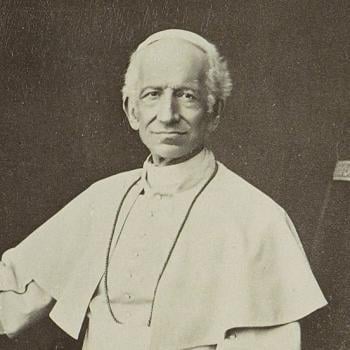The crusade to enshrine the Ten Commandments in U.S. public schools reached a couple of landmarks in the past few days. Last week a panel of three federal appellate judges found Louisiana’s Ten Commandments law unconstitutional. A few hours after the Louisiana ruling was announced, Gov. Greg Abbott signed a nearly identical bill into law in Texas. This week lawsuits to stop the Texas bill are being filed. And many of these lawsuits are being filed by religious people, including Christian clergy. Here I want to look at the way these bills violate the free exercise of religion. And note that neither of these bills differs significantly from one passed in Kentucky in 1978 and declared unconstitutional by the U.S. Supreme Court in 1980.
Both states’ laws stipulate that the Ten Commandments must be prominently displayed in every primary and secondary public school classroom, no exceptions allowed. Both laws stipulate that the Commandments must be displayed so they can easily be read from any seat in the classroom. Further, both states have determined the precise wording of the Commandments. In both cases this wording appears to be condensed from the King James version of Exodus 20:1-17, with all the “thees” and “thous” intact.
Why Do Some Religious People Object to Ten Commandments in Schools?
I realize that many folks don’t see the harm. But many of the people who brought suits against the Louisiana law, and who are preparing suits against the Texas law, are religious people who say it violates their freedom of religion. One suit brought by a group of Christian and Nation of Islam faith leaders and families called the Texas law “a threat to the soul of both our democracy and our faith.” “The government should govern; the Church should minister,” the lawsuit said. These families don’t want the government teaching their children about religion.
Many religious people have problems with the state-sanctioned wording of the Ten Commandments. There are two versions of the Ten Commandments recorded in the Torah, in Exodus chapter 20 and in Deuteronomy chapter 5. These are very similar but not identical, and when you add variations in translations, the differences get bigger. Further, there are endless subtle variations in how these scriptures are interpreted. There is an accepted Jewish version of the Commandments that differs somewhat from most Christian versions. And the Catholic version differs from most Protestant versions. One of the objections to the Louisiana law, coming from both Jewish rabbis and Christian ministers, was that the official state version of the Commandments differed from the Commandments they wanted to teach their children.
Note that the Quran of Islam does not present a version of the Ten Commandments. Muslims say many verses in the Quran present the same teachings. Other major religions, such as Hinduism, Buddhism, and Sikhism, have their own moral codes with different emphases. Speaking for Buddhists, I can say the “God” parts of the Commandments are unacceptable for most of us. Note that some members of the Texas legislature offered an amendment that would have allowed the moral codes of other religions to be displayed in classrooms as well. This was voted down.
When a branch of government decides on an “official” version of scripture to teach children, this seems to me to be an obvious violation of the establishment clause of the First Amendment of the U.S. Constitution. It’s right up there with government deciding which prayers children should pray. This is a matter for childrens’ parents to decide, not government.
The Ten Commandments as Covenant
Father Richard J. Clifford, S.J., is a professor emeritus of Old Testament studies at Boston College. In the July/August 2025 issue of the Jesuit magazine America, he explains “Why the Ten Commandments should not be posted in public school classrooms.” Father Clifford writes that “the Bible itself contains the most powerful argument against making the Ten Commandments a moral guide for all citizens.” Understanding this requires looking at the context, the story of how God gave the Commandments to Moses and his people.
Father Clifford writes that, in context, it’s clear that “the Ten Commandments are the textual expression of a solemn covenant, a legal agreement, between the Lord and the people.” They were not intended for the Egyptians or other people mentioned in Exodus. And, Father Clifford explains, they were not intended to be universal laws given to everybody. In Jewish tradition there are universal laws given to everybody, such as the commands God gave Noah after the Flood. But in context the Ten Commandments were part of an agreement between God and the people Moses led out of Egypt, and no one else.
I realize a lot of Christians will disagree with this, and it’s not my place here to decide who is correct. But do be aware that there is a biblical argument that it’s wrong to push the Ten Commandments as binding on all human beings.
The Ten Commandments in American History?
The people who want the Ten Commandments displayed in every classroom argue that the Commandments are the basis of U.S. laws and were a vital part of U.S. history. This is nonsense. As I argued in an earlier post, The Ten Commandments and the Origins of Law, the Ten Commandments were not the first legal code in human history. In fact, some historians argue that the Commandments themselves were influenced by the earlier Law Code of Hammurabi, who reigned in Babylon from 1792 to 1758 BCE. And we have fragments of other law codes that are even older. U.S. law grew out of English law, and English law had many origins. Some of these include the laws of the old (and pagan) Roman Empire, for example. The English laws introduced into the North American colonies mostly developed from Norman law, which itself was influenced by Viking law. There is simply no historical dotted line going directly from the Ten Commandments to U.S. law.
As far as U.S. history is concerned, there’s no question Christianity was a significant influence. But the Ten Commandments don’t belong exclusively to Christians — they’re from Jewish scripture, folks. And speaking as an American history nerd, I just don’t see the Ten Commandments as having any unique place in U.S. history. As far as American history is concerned, the Commandments are just one small thread in a huge and complex tapestry. If I were to choose one text to enshrine in every classroom, I’d suggest Lincoln’s Gettysburg Address, or the opening section of the Declaration of Independence. Or even the preamble to the Constitution.
These new laws will no doubt end up with the Supreme Court eventually. How the current Court will rule is impossible to predict.












